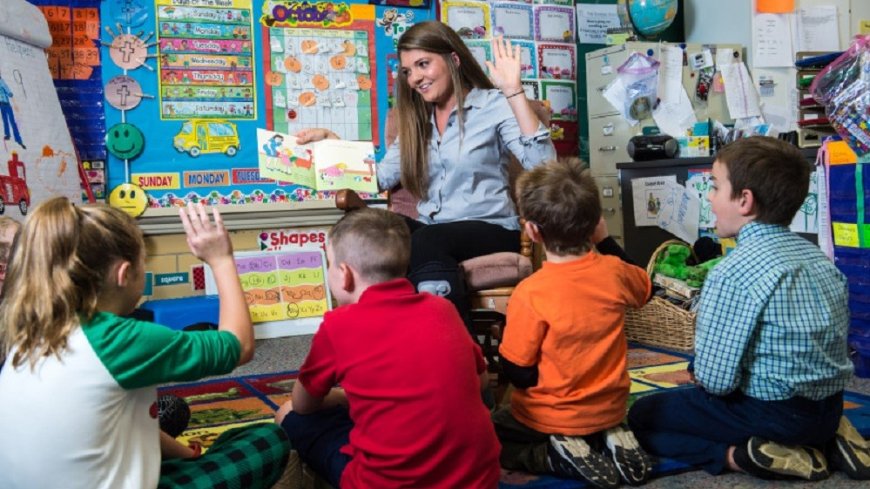Elementary Education with Pedagogical Therapy
educational practice in Western countries, and therefore our social reality is lagging behind. Elementary Education with Pedagogical Therapy.

The theorems of psychology, universally recognized in science, prove that human development - especially in childhood - is holistic and must be understood in many ways and as a whole. All spheres of a child's development are one, they mutually condition and complement each other, and the process of shaping and developing a child runs integrally throughout childhood, including the so-called preschool and early school age. These stages of development cannot be treated separately, which must be directly translated into the concepts and practices of educating and qualifying teachers prepared to purposefully support a child's development throughout their childhood - which is recognized, implemented and observed by contemporary pedagogy and educational practice in Western countries, and therefore our social reality is lagging behind. Elementary Education with Pedagogical Therapy.
Therefore, it is necessary to definitely depart from the traditional and conservative division into "preschool education" and "early childhood education", into separately educated "pre-school education teachers" and "primary education teachers", and to shape and develop in thinking, concepts and operation the paradigm of elementary education, which the essence is holistic and integral, purposeful support of the child's development in the period up to 10/11 years of age.
An expression of such a modern approach is the specialty called elementary education with pedagogical therapy. It also integrally covers the care, upbringing and education of the child, and also includes all the areas of child education required by the current educational regulations, as specified in the core curriculum for pre-school education and integrated education (in grades 1-3).
Graduates of the specialization acquire, in particular, extensive and in-depth psycho-pedagogical knowledge, with particular emphasis on understanding the course of a child's development and its determinants, as well as educational support for the child's development. They are able to take into account the specificity of the organization of education focused on the individual and its development, individual characteristics of learning and developing learning adapted to the current developmental state of the child and supporting the so-called spheres of immediate development. Graduates have managerial competences related to planning, time and space management, motivation, order in the kindergarten and school room, in the field of diagnosis and evaluation of a child's educational effort. They have interactive competences related to the conscious and reflective use of child- and development-oriented teaching-learning models. They also have organizational competences (organization of education, group organization, didactic and educational process, organization of cooperation with parents) related to the deliberate creation of a valuable and desirable learning environment.
Graduates must also be competent to create optimal care and educational conditions and learning conditions for children revealing atypical educational needs - to which the answer is the second part of the specialization, namely pedagogical therapy. Therefore, the graduate will gain knowledge about conditions conducive to and restrict the child's development, will acquire diagnostic competences in the field of recognizing individual developmental possibilities of a student, as well as learn methods of diagnosing the conditions of development and supporting the multilateral and integral development of the child.
Must Read: What motherboard for the AMD Ryzen and Intel Core processor?
First-cycle studies in the field of pedagogy, specializing in elementary education with pedagogical therapy prepare a graduate who:
- He has psychological and pedagogical knowledge that allows him to understand the processes of development, socialization, upbringing and teaching - learning.
- Has knowledge of didactics and detailed methodology of pedagogical activity, supported by experience in its practical use.
- Has the skills and competences necessary for the comprehensive implementation of the didactic, educational and care tasks of the school, including the independent preparation and adaptation of the curriculum to the needs and abilities of students.
- Demonstrates the ability to learn and improve his own pedagogical workshop with the use of modern means and methods of obtaining, organizing and processing information and materials.
- He skilfully communicates with the use of various techniques, both with people who are the subjects of pedagogical activity, as well as with other people cooperating in the didactic and educational process and with specialists supporting this process.
- It is characterized by ethical sensitivity, empathy, openness, reflection, pro-social attitudes and a sense of responsibility.
- Is practically prepared to carry out professional tasks (didactic, educational and caring) resulting from the role of a teacher, understands the direction of changes in elementary education.
The broad-profile elementary education and pedagogical therapy specialization - in accordance with the applicable standards of education preparing for the teaching profession - prepares students for teaching positions in kindergartens and grades 1-3 of primary schools, i.e. teachers of pre-school education and early-school education teachers. The specialization also gives the right to work as a guardian in children's clubs and nurseries. After three years of work with children, the graduates acquire the right to become the director of the nursery. At the same time, graduates obtain qualifications to conduct classes in pedagogical therapy (didactic and compensatory classes, corrective and compensatory classes, speech therapy prophylaxis) with preschool and early school-age children.
